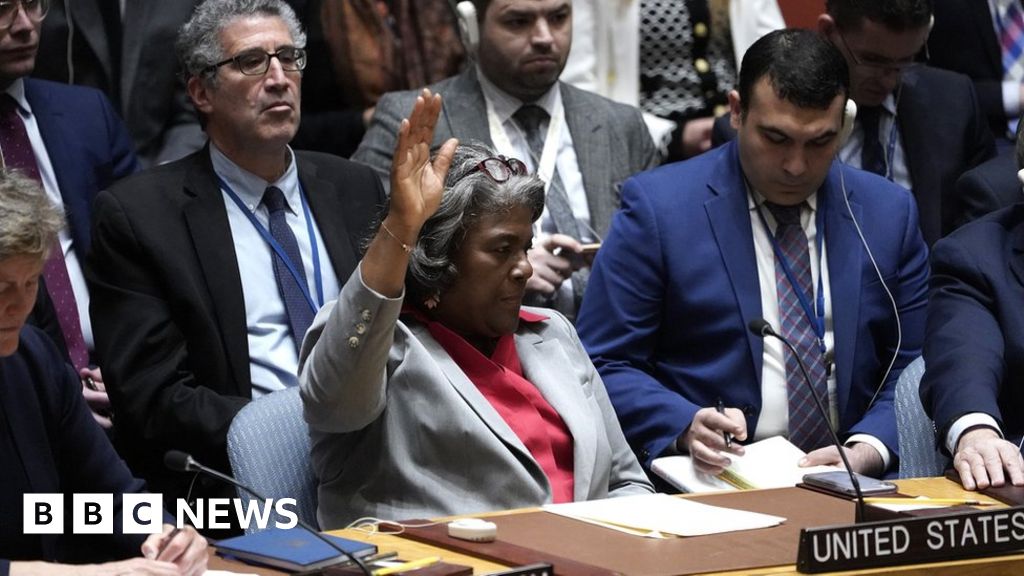
Watch: The moment the United Nations ceasefire resolution was issued in Gaza
The United Nations Security Council called for an immediate ceasefire in Gaza, after the United States did not veto the measure in a shift from its previous position.
It also demanded the immediate and unconditional release of all hostages.
This is the first time that the Council has called for a ceasefire since the war began in October after several failed attempts.
The American move indicates an increasing dispute between it and its ally Israel regarding the Israeli attack on Gaza.
In an unusually strong rebuke, a statement from Israeli Prime Minister Benjamin Netanyahu's office said the United States had “abandoned” its previous position that directly linked the ceasefire to the release of the hostages.
She added, “Unfortunately, the United States did not use its veto power against the new resolution.”
The statement said this harmed efforts to release the hostages by giving Hamas hope that it could use international pressure on Israel to reach a ceasefire without releasing the prisoners.
She also said that Netanyahu decided to cancel meetings between an Israeli delegation and American officials in Washington that were scheduled to take place this week.
The Israeli Defense Minister said that Israel will not stop the war in Gaza while the hostages are still being held there.
The Palestinian delegate to the United Nations, Riyad Mansour, welcomed the decision, but said it was late.
“It took six months, the killing and maiming of more than 100,000 Palestinians, the displacement of two million, and famine, for this council to finally demand an immediate ceasefire,” Mansour said.
Hamas, the Palestinian Islamist group that rules Gaza and which sparked the war with an unprecedented attack on Israel on October 7, also welcomed the decision. She said she was ready “to enter into an immediate prisoner exchange process that will lead to the release of prisoners from both sides.”
The movement made any release of hostages conditional on Israel releasing Palestinians detained in Israeli prisons.
In the Security Council vote on Monday, the United States abstained, while the remaining 14 members voted in favor of the resolution.
The United States had previously blocked resolutions calling for a ceasefire, saying such a move would be wrong while delicate negotiations to reach a truce and release the hostages were ongoing between Israel and Hamas.
But on Thursday, it presented its own draft calling for a ceasefire for the first time, marking a hardening of its position towards Israel.
US National Security Council spokesman John Kirby said that the US decision to allow the resolution to pass does not mean “a shift in our policy.” He said that the United States supported the ceasefire but did not vote in favor of the resolution because the text did not condemn Hamas.
Speaking at a press conference after the resolution was passed, Kirby said: “We've been very clear, we've been very consistent in our support for a ceasefire as part of the hostage deal. This is the way the hostage deal is structured, this is the way the hostage deal is structured.” “. The resolution acknowledges the ongoing talks.”
UN Secretary-General Antonio Guterres said the resolution “must be implemented” to ensure a ceasefire and “the immediate and unconditional release of all hostages.”
The United States has pressed Israel to do more to deliver aid to Gaza, where it says the entire population suffers from food insecurity.
Mark Lyall Grant, who was the UK's ambassador to the UN from 2009 to 2015, told the BBC's 4pm programme, the decision meant Israel was now “committed, essentially, to halting its military campaign within 15 days”. “Coming.” The remaining period of the holy month of Ramadan stipulated in the ceasefire text.
He added that the text is legally binding on Israel but not on Hamas, because the Palestinian movement is not a state.
The United States had previously been accused of using its veto power to protect Israel at the United Nations.
However, it has become increasingly critical of Israel over the mounting death toll in Gaza, where more than 32,000 people, most of them women and children, have been killed by Israeli bombing, according to the Hamas-run health ministry in the enclave.
The United States has also pressed Israel to do more to deliver aid to Gaza, where it says the entire population is suffering from severe levels of acute food insecurity.
The United Nations accused Israel of obstructing aid; Israel accused the United Nations of failing to distribute aid.
The current war broke out after Hamas militants stormed the border and attacked Israeli communities, killing about 1,200 people, according to Israeli statistics, and taking 253 people to Gaza hostage.
130 of the people who were captured are still missing after a series of release, rescue and recovery operations.
Despite Israel's decision to cancel a scheduled visit by its delegation to Washington later this week in the wake of the Security Council resolution, Kirby said the scheduled meetings between Israeli Defense Minister Yoav Gallant and US National Security Advisor Jake Sullivan will continue as planned.
“We look forward to making clear to the Secretary of Defense that the United States continues to stand with Israel in its fight against Hamas,” he said at the press conference on Monday.




More Stories
Journalists convicted in Hong Kong sedition case
Stand News: Hong Kong journalists convicted of sedition in case critics say highlights erosion of press freedom
Shark decapitates teen off Jamaica coast